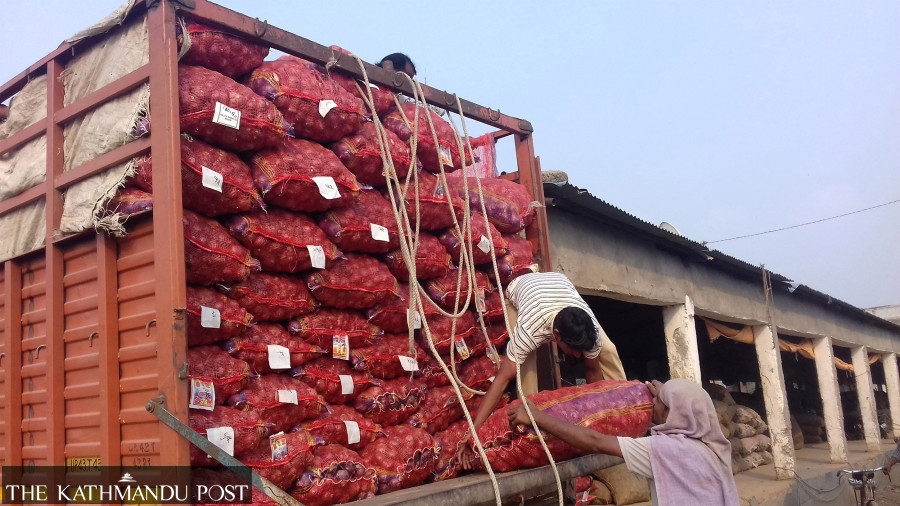Money
Onion smuggling thrives after Indian export ban
The staple has become expensive in Nepal. Due to the price differences in Nepal and India, it has become a lucrative business for smugglers, insiders say.
Post Report
Despite India's sweeping ban on onion exports, the supply has returned to normal in Nepali markets, traders say, pointing out rampant smuggling.
The Kalimati Fruits and Vegetable Market, the country’s largest wholesale market, has been receiving 60-70 tonnes of onion daily, offsetting the prices which had jumped to Rs200 per kg a few weeks ago.
“The Kalimati market is receiving onions as on normal days. Out of the total arrivals, 90 percent of onions are from India. The Chinese onions are negligible,” said Binay Shrestha, information officer at Kalimati Fruits and Vegetable Market Development Board.
On December 7, India imposed a ban on exports of onions until March 31, 2024.
Traders say smuggling is rampant in the bordering towns.
On Saturday, Rupandehi Police seized 28 bags of onion (1,700 kg) worth Rs85,000 which had no invoice.
Last Tuesday, the Armed Police Force seized illegally imported onions and clothes worth Rs2.4 million from various places in the Parsa district.
Last Friday, Bara police seized 17,730 kg of onion from Pathlaiya Chowk.
Two weeks ago, the District Police Office Bara seized onions worth Rs72,000 from the same area.
On December 22, the District Police Office in West Nawalparasi seized around 900 kg of onions worth Rs400,000 from Dharmauli in ward 5 of Pratappur Rural Municipality and Bhagatpur in ward 5 of Palihinandan Rural Municipality.
On December 17, police in Kavrepalanchok district seized more than 400 sacks of onions from Kavre Bhanjyang of Dhulikhel Municipality.
The police seized seven vehicles carrying 16 tonnes of onion that were illegally imported using old invoices.
According to Indian media reports, onion smuggling has increased from rural areas of Siwan Tola, Hajma Tola, Sahadeva, Mahadeva, Musharwa, Nayaktola, Inarwa, Beldarwa, Sundarpur, Bhelahi, and Siswa of Pentaka in Raxaul, India.
Onions are being smuggled through bicycles, e-rickshaws, Tom-Toms, and motorbikes.
The Indian media reported that the smuggler racket has been smuggling onions.
With the export ban on onion, the price of onion has declined in India, but it has fueled smuggling due to the price differences in Nepal.
The wholesale price of onion has been hovering at around Rs90 per kg in Nepal, while the wholesale price in India’s Uttar Pradesh is IRs49 per kg. In retail, onion costs Rs120 per kg.
The prices, however, have yet to come down despite the normal supply in the market.
In the first week of November last year, ahead of the Tihar festival, onion suddenly became pricier after India slapped a minimum export price to check shipments and ensure adequate supplies for its domestic consumers.
After the minimum export price was slapped, the wholesale price of onion jumped to Rs125 per kg from Rs75 per kg previously.
In mid-November, the price reached Rs150 per kg.
Before the minimum export price, India had imposed a 40 percent export duty on onions.
The customs officials said as onion smuggling has increased sharply in many of the Nepal-India border points, they have appraised the issue to the Department of Customs.
At least three customs officials whom the Post talked to said that they have allowed onion imports in small quantities.
One customs official said they allow people to bring around three sacks of onions per person by showing the invoice.
According to a department official, who spoke on condition of anonymity, there is a circular to give customs clearance to onions just like other goods if people pay customs duties.
The goods are evaluated based on the market price.
Narayan Prasad Gaire, chief of Suthauli Customs Office, Kapilvastu, said his office has been seizing illegally-imported onions in huge quantities.
“We auction off the seized onions.”
“The customs office has been conducting regular inspections. But despite that, the onions are being smuggled, particularly, on motorbikes.”
A motorbike can carry four sacks of onion. One rider can supply 10-15 bags a day, said Gaire. “The smugglers have groups. If one gets caught, others stop for that particular day at a particular point.”
With the Indian customs not providing the export clearance document, especially on restricted goods, the Nepali customs cannot make customs clearance, officials said.
“We have not banned the import of onions. If it comes through the system, we allow it,” said Dilaram Panthi, chief of Birgunj Customs Office.
“We should not be very negative if someone wants to bring goods by paying taxes.”
He said that some onions have arrived through illegal channels, but they are in small quantities.
In Bhairahawa, large quantities of onions have been seized in the last few weeks after the ban was imposed.
“People are importing onions illegally,” said Narad Gautam, chief of the Bhairahawa Customs Office. “The seized onions are submitted to the customs. We auctioned them.”
“It’s difficult to keep on constant monitoring in the borders to stop illegal imports.”
According to the Department of Customs, Nepal imported 180,190 tonnes of onions worth Rs6.75 billion from India in the last fiscal year.
The onions sold in Nepal come mainly from Nashik, Indore, Kanpur and Gujarat in India. Nepal depends on imported onions as domestic production is negligible.
China is another source of onions for Nepal, but the Chinese product is mostly used for making salads, mainly in hotels and restaurants.




 10.12°C Kathmandu
10.12°C Kathmandu













